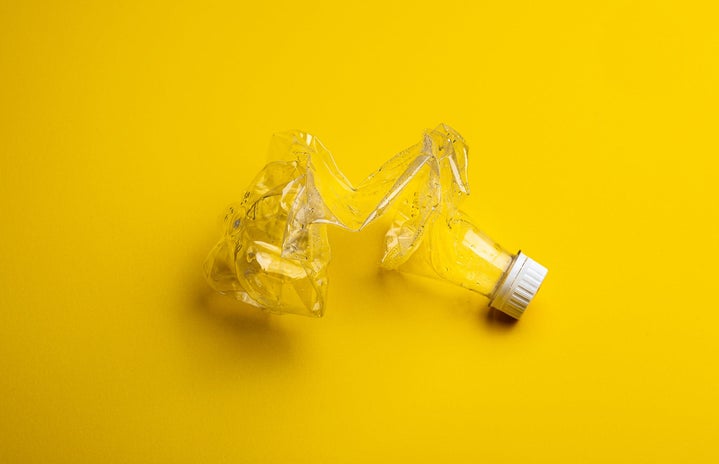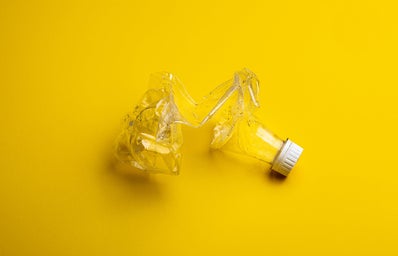It’s easy to feel hopeful about the future when attending a college that is predicted to be plastic-free by 2030. However, these efforts, as much as they are a huge step in the right direction, are just a drop in the ocean that is reducing the environmental damage that we place on this Earth. The reality is that college campuses in the US have a huge waste problem. According to Planet Aid, the average college student produces a shocking 640 pounds of trash each year. Every plastic water bottle, soda can, and even makeup wipe adds up. While making the transition to a more sustainable lifestyle is something that I am very passionate about, I understand that it is not necessarily the most convenient or practical way of living for every student. For this reason, I decided to meet with the Co-Presidents of Alliance for Planet Earth (APE), Zanna Ellison, and Mariah Gehringer. The two shared some of their tips and tricks for eco-friendly living on campus that are sure to help any student who’s new to or interested in sustainable living!
- Tell us a little bit about APE and how you got involved!
-
Zanna: Alliance for Planet Earth is a club that started in the 90s to focus on environmental sustainability, and since it has been passed down to us, we have made an effort to expand its purpose to social sustainability and supporting the sustainability-focused events that are already happening around campus. While the club started with litter sweeps and recycling, we’ve decided to branch out even further to other issues such as food security. I have been interested in sustainable agriculture and trying to reduce my waste for four years now. I did a few events with APE, and once the presidents graduated, I stepped up to carry on the club.
Mariah: I describe APE as a hands-on sustainability club on and off-campus. As Rowan [Emerson], a member of the club, says, “It is student-run and student-led.” We make sure to support the ideas and proposals of members of the group and try to make them happen. I have been apart of this club on and off since my freshman year. At the beginning of my junior year, I had the opportunity to come back with a leadership position alongside Zanna, and I love it.
- What are the easiest ways to transition to a more sustainable lifestyle as a college student?
-
Zanna: Along with finding a support network, I would say something that pushed me towards sustainability before and during college was making the effort to reduce consumption. I think when you’re in college, all of us are trying to save money and on top of that, reducing consumption is not something that is so strict that it’s intimidating, it’s just something that can be a general life goal. This can mean trying to shop more secondhand or eating more low impact foods. I was inspired to try to grow all my own produce. Even if that means I’m not eating as many avacodos, since they are not always in season, I am still getting great veggies from the garden. It’s an abstract idea but it can be applied to anything. College can be a selfish time and we spend alot of time being told to think about ourselves and our futures. Living more sustainably gives you the opportunity to make decisions for yourself about where you’re going to source your clothes and food. You can start developing a community for when you need a new item and make it a goal to limit your waste today.
Mariah: One of our priorities in this club is that we make sure to talk about events going on all around campus, even outside of what our club is doing. We tell people about what Vegan Club is doing or even things that are happening in our city and globally. Joining a club is the best way to begin this transition becuase you’ll find like-minded people who have their own innovative ways of living sustainably. Through this club, I found out about the campus’ food pantry, the Stone Soup Collective, and the Stono Preserve. I always used to think it was good to own a metal utensil or metal straw but I’ve learned now that after I’ve gotten all the use I can out of it, a bamboo straw might be a better option. I have my own tips and tricks but sometimes it’s nice to have people to bounce around different ideas with. Two minds are better than one.
- What are some everyday items that can make being sustainable more convenient?
-
Zanna: I use a jar for coffee and restaurant leftovers. That way, you can use it to take home food that you don’t want to go to waste.
Mariah: I carry sort of like a pocket knife that I got from Artist and Craftsman Supply. It has a spoon, fork, knife, and a bottle opener. I also tried to figure out what material would be best for a coffee cup so I carry around a tin coffee cup because it is the lightest, most durable material. Get the stainless steel and not the kind with the paint enamel on the inside. I always carry my reusable straw and a bamboo toothbrush for when I sleepover at my friends’ houses.
- Are there any specific things/places around CofC that students who want to be more eco-friendly should know about?
-
Zanna: A lot is coming to mind but I’d say the Office of Sustainability is a big avenue for bike renting, getting involved with recycling, internships, and getting advise from professionals about sustainability. They also have a big focus on social sustainability so it’s not just about the green side of sustainability. We can talk about issues such as social justice. Another great hack is if you bring your own cup to the Starbucks on campus, you can get coffee for fifty cents.
Mariah: Zanna is really good at considering all factors of sustainability whenever we are planning events. I mentioned the Stone Soup Collective before but APE is also a really good resource to constantly get updates about things happening on campus. The Office of Sustainability also has a location to drop off your E-Waste and TerraCycle materials.
- What should students do if they want to get involved with APE?
-
Zanna: Follow our instagram and then DM us to join the mailing list and the Groupme.
Mariah: Follow us on Instagram! Add us on Groupme and follow our calendar where we update about events that are happening. Get connected to us, you can even message us directly.
If any student is looking to start their transition into sustainable living, Alliance for Planet Earth is definitely the perfect place to get involved. Students can get connected by following the organization’s Instagram account @allianceforplanetearth. The club also holds weekly meetings on Tuedays from 8-9 PM.


